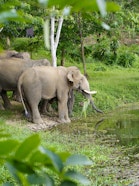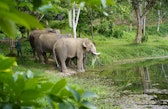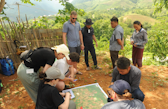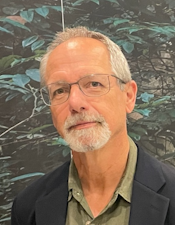Where Elephants Lead: A Journey into Systems Transformation in Laos
Project Update
Publish date: July 31, 2025

Where Elephants Lead: A Journey into Systems Transformation in Laos
Project Update
Publish date: July 31, 2025
In June 2025, the Wyss Academy for Nature and the MSc Geography program at the Institute of Geography, University of Bern, brought over 30 students from Switzerland and Laos on a ten-day field excursion to explore what systems transformation looks like on the ground. Set against the backdrop of Laos—a biodiversity hotspot under pressure—the excursion combined hands-on learning with intercultural exchange, enabling students to embed their academic knowledge into real-world sustainability challenges.

One of the most impactful stops along the journey was the visit to the Elephant Conservation Center (ECC) in Xayabury, marking the first official educational visit to the Center’s Education, Conservation & Research (ECORE) program. At the ECC, students were introduced to pressing environmental challenges such as the expansion of monocrop-driven agriculture, which threatens forest biodiversity and traditional land-use systems.
This issue was contextualized within the broader work of our Hub Southeast Asia’s Solutionscape, a collaborative approach focused on developing solutions that protect and restore nature while supporting the people who depend on the land and its resources.

The ECORE program at the ECC served as a living laboratory for deeper reflection. As students witnessed elephant rewilding in practice, they were encouraged to think critically about what transformation means. How can conservation balance local development needs? What trade-offs are involved when global conservation goals meet local realities? How can local efforts to mitigate the threat to flora and fauna be shared with a wider audience to raise awareness at the global level? Underpinning all these questions is a broader concern: how to integrate valuable but often overlooked local knowledge with formal scientific approaches for mutual benefits.
These reflections were made possible through the structure and intent of the ECORE program, which provides a space for meaningful exchange between formal and informal knowledge. While the initial focus is on the elephants, the program is not limited to megafauna and will expand to broader biodiversity conservation efforts.
The visit also offered an insightful intercultural learning experience. Students had the opportunity to hear directly from those working on the frontlines of conservation—the guardians protecting both the forests and the animals. Working in mixed Lao–Swiss groups, students exchanged perspectives shaped by different cultural, academic, and environmental backgrounds. This collaboration opened space for transdisciplinary dialogue and gave students a firsthand understanding of what it takes to co-create knowledge across borders and disciplines.
Soulichan Lamxay, Deputy Head of Research Sciences and Academic Division at the Faculty of Environmental Sciences, National University of Laos, shared that the experience with ECORE inspired him to “work closely with communities to co-create products or services linked to elephant conservation or grounded in sustainable practices that support the broader ecosystem.”

As they left Xayabury, the group carried with them lasting impressions from the Elephant Conservation Center. In a landscape where conservation, community, and development must coexist, the visit underscored the need for collaborative, science-informed approaches that are both ambitious and deeply rooted in local realities.
Julie G. Zähringer, Professor of Land Systems and Sustainability Transformations at the University of Bern, said, “In conservation, there is an increasing acknowledgement by all partners that finding solutions to the wicked problem—protecting nature while at the same time enabling communities to develop economically—requires all the brainpower that’s available.” This approach underpins the work of the Wyss Academy for Nature’s Hub Southeast Asia, which actively supports initiatives like the ECORE project. By bringing together researchers, local communities, and decision-makers, the Hub continues to encourage collaborative efforts to co-create pathways for sustainable development and biodiversity conservation in the region.
Team
- Project contactProject contact
Dr. Horst Weyerhäuser
Hub Director
